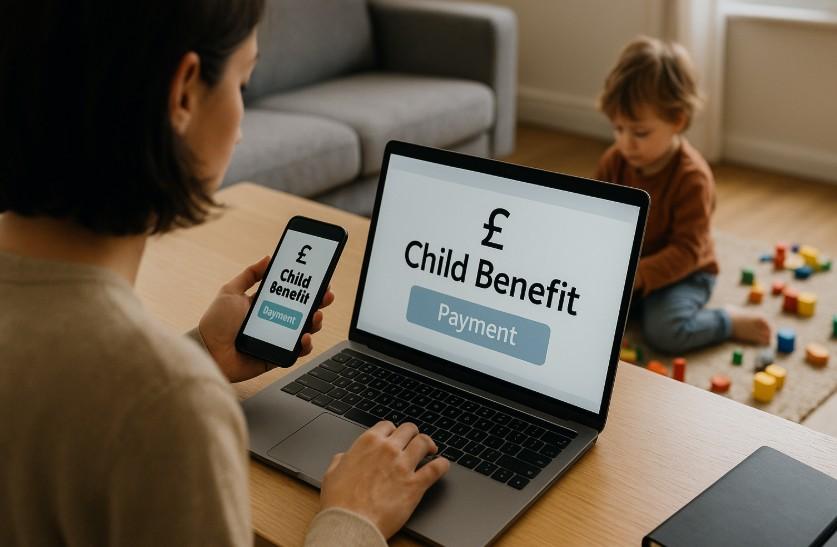If you rely on Child Benefit to manage your household expenses, knowing exactly when the payment reaches your bank can make planning much easier. Many families in the UK wonder what time Child Benefit goes into their bank accounts and how factors like bank processing times, holidays, and the day of the week might affect this.
Payments are processed by HM Revenue and Customs and delivered via Bacs transfers, which banks handle overnight. While most payments appear early in the morning, the exact timing can vary depending on your bank’s procedures.
Understanding the payment schedule, potential delays, and ways to track your funds ensures you are never caught off guard. This guide answers the most common questions about Child Benefit timing, including when first payments arrive, what to do if money is delayed, and how to plan your finances around these regular deposits.
What Time Will Your Child Benefit Payment Reach Your Bank?

Knowing the time Child Benefit reaches your bank account is essential for budgeting and financial planning. Most payments are made via Bacs transfers, which banks process overnight. Typically, funds appear between midnight and 7 AM on the scheduled payment day. However, this can vary depending on your bank’s internal processes and systems.
Payments are generally scheduled for Mondays or Tuesdays, and banks often release funds shortly after receiving the payment file from HMRC. Some banks process funds slightly earlier, while others may credit accounts only in the early hours of the morning.
Factors that influence the exact timing include:
- Bank processing schedules
- Technical issues or maintenance work
- Bank holidays affecting standard processing
- The type of account, whether personal, joint, or digital
Here’s a general guide to expected deposit times for different banks:
| Bank Type | Estimated Payment Time | Notes |
| Traditional Banks | Midnight to 7 AM | Can vary slightly depending on branch |
| Digital Banks | 12 AM to 1 AM | Often faster due to automated systems |
| Weekend/Bank Holidays | Payments adjusted to last working day | Early processing may apply |
In general, checking your account shortly after midnight on your payment day is recommended. If your funds haven’t arrived by 7 AM, it could indicate a processing delay or that the payment is still in transit. Being aware of this window allows you to plan essential payments like bills and groceries without stress.
What Days Are Child Benefit Payments Made in the UK?
Child Benefit payments in the UK are designed to provide families with regular financial support. By default, payments are made every four weeks, usually on a Monday or Tuesday. This schedule helps families align benefit payments with other regular household expenses.
Some claimants may be eligible for weekly payments. This is often the case for single parents or those receiving income-related benefits such as Income Support, Jobseeker’s Allowance, Pension Credit, or Employment and Support Allowance. Weekly payments provide more frequent access to funds for families who need it.
Key points to know about payment days include:
- Standard payment frequency is every four weeks
- Payment day is typically Monday or Tuesday
- Bank holidays may result in early processing
- Weekly payments are available for eligible claimants
Here’s a quick comparison:
| Payment Frequency | Eligible Claimants | Best For |
| Every 4 Weeks | Default for most claimants | Families with monthly budgets |
| Weekly | Single parents or those on income-related benefits | Families needing frequent cash flow |
Understanding the standard schedule and eligibility for weekly payments helps you plan your finances and anticipate when funds will appear in your account.
Can the Time Vary Based on Your Bank?

The exact time Child Benefit reaches your account can vary depending on your bank. While HMRC sends the payment at the scheduled time, your bank decides when to credit it to your account.
Some banks process incoming payments overnight, making funds available shortly after midnight. Others may have batch processing systems that credit accounts later in the morning.
Factors affecting deposit timing include:
- The time HMRC sends the payment
- Bank processing schedules
- Technical issues or maintenance
- Account type, such as personal, joint, or digital
Estimated deposit times for common bank types:
| Bank Type | Typical Payment Window | Notes |
| Barclays | 11:45 PM to 12:30 AM | Traditional overnight processing |
| HSBC | 12 AM to 1 AM | Standard for most savings/checking accounts |
| Lloyds Bank | 11:30 PM to 12:30 AM | Some accounts may release earlier |
| Nationwide | 12 AM to 1:30 AM | Slightly later processing |
| Monzo | Around 1 AM | Digital bank, faster processing |
| Starling Bank | By 12 AM | Automated system, often early |
| NatWest | 11:45 PM to 12:15 AM | May vary depending on branch |
It’s important to remember that the exact time is not guaranteed and can differ each payment cycle. Monitoring your usual deposit times helps set realistic expectations.
Bank-specific delays, holidays, and technical updates can all influence when the money appears, so being aware of these factors can help prevent unnecessary concern.
What Should You Do If Child Benefit Hasn’t Arrived?

If your Child Benefit payment does not appear on your scheduled day, it’s important to remain calm and follow a systematic approach. Payments are generally processed overnight, so checking your bank account early in the morning is the first step.
Step-by-step Checklist to Follow
- Check your bank statement for the reference ‘HMRC Child Benefit’
- Confirm your bank’s processing times for overnight payments
- Review any recent letters or messages from HMRC
- Ensure your bank account details are up to date
When to Contact HMRC?
If the payment has not arrived by 7 AM on the expected day, contact HMRC. They can verify whether the payment was sent and provide guidance if further action is needed.
Common Issues Causing Delays
- Bank details were not updated after a change
- Pending confirmation from HMRC regarding child’s education or living status
- Bank holidays affecting processing times
- Technical errors with your bank
Here’s a summary for clarity:
| Issue | Action Required |
| Payment not visible | Check statement and bank processing |
| Bank details changed | Update HMRC promptly |
| Pending information | Respond to HMRC requests |
| Bank holiday delay | Expect early or adjusted processing |
Following these steps ensures you can quickly identify the reason for any delay and take appropriate action. Staying proactive prevents financial stress and ensures continued access to your Child Benefit payments.
When Will You Receive Your First Child Benefit Payment?

The first Child Benefit payment may take longer than subsequent payments to arrive. Once your application is approved, the first payment typically takes up to 12 weeks. This initial processing period allows HMRC to verify eligibility and ensure all documentation is correct.
The first payment can also be backdated for up to three months. This means that even if it takes several weeks to arrive, you will receive the full entitlement for the period starting from your claim date. Families who have recently moved to the UK may experience longer delays due to additional checks and proof of residence requirements.
To anticipate your first payment:
- Check your award notice for the payment date and entitlement
- Count four weeks from your first payment to determine the next payment
- Ensure all bank and personal details are accurate with HMRC
Receiving the first payment on time sets a predictable schedule for future deposits. By understanding the expected processing period and backdating rules, you can plan household finances effectively and avoid unnecessary concern if the payment takes longer than anticipated.
How Can You Track and Plan Your Future Payments?
Once your first Child Benefit payment is received, tracking future payments becomes easier. The schedule is generally every four weeks on a Monday or Tuesday, but bank holidays may require adjustments.
You can track payments by:
- Referring to your award notice to confirm the payment frequency
- Checking your bank statement for the reference ‘HMRC Child Benefit’
- Using your HMRC online account to view past five payments
Tips for planning ahead:
- Set calendar reminders based on previous payment dates
- Keep a personal record of each deposit
- Update HMRC promptly if your circumstances or bank details change
Counting four weeks from the last payment date helps you calculate the next expected deposit. Monitoring payment patterns and noting exceptions during holidays ensures you are prepared for any variation in timing.
Proactively managing Child Benefit payments helps you budget effectively, avoid late bill payments, and maintain financial stability for your family.
Conclusion
Child Benefit plays an essential role in supporting families across the UK. While payments are generally scheduled every four weeks on a Monday or Tuesday, the exact timing can vary based on your bank’s processing system, technical issues, and public holidays.
First-time payments may take up to 12 weeks and can be backdated to cover prior months, ensuring families receive their full entitlement. Staying informed about deposit times, tracking past payments, and maintaining accurate bank details with HMRC are key to avoiding delays.
By following the recommended steps when payments are late and proactively planning future payments, you can manage your household finances confidently.
Understanding the Child Benefit schedule allows you to prepare for both expected and unexpected delays, giving peace of mind and ensuring continuous support for your family’s needs.
FAQs
What does HMRC Child Benefit look like on a bank statement?
It appears as a reference starting with ‘HMRC Child Benefit’ followed by a unique alphanumeric code. This helps you identify the payment quickly.
Can Child Benefit be paid weekly instead of every four weeks?
Yes, weekly payments are available for single parents or claimants receiving certain income-based benefits.
How long does it take to receive the first Child Benefit payment?
Typically up to 12 weeks, but delays can occur for new UK residents. Payments can be backdated for up to three months.
Do all banks deposit Child Benefit at the same time?
No, timing varies between banks, generally between midnight and 1:30 AM. Digital banks may release funds slightly earlier.
What if I changed my bank account recently?
You must inform HMRC of any changes to avoid delays or missing payments.
Why was my Child Benefit payment delayed?
Delays often occur due to bank holidays, pending updates to your account, or missing information about your child’s circumstances.
How do I report a missing or incorrect payment?
If the payment hasn’t arrived and your bank confirms no deposit, contact the Child Benefit Office with your National Insurance number.








